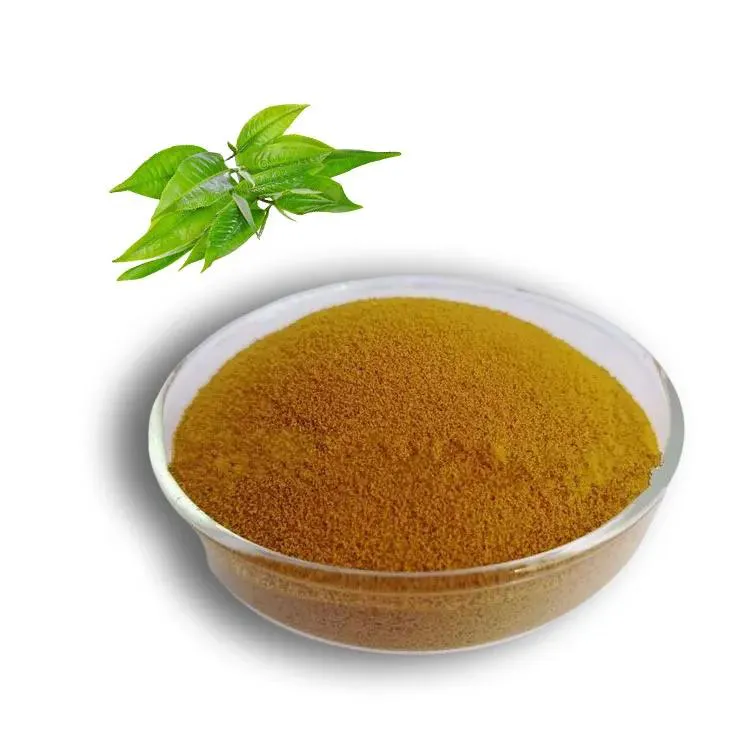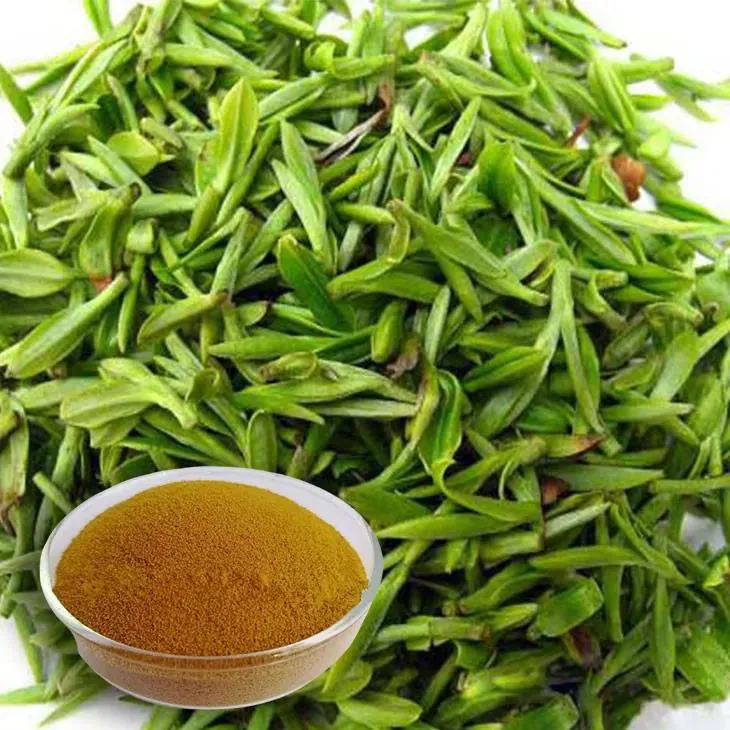- 0086-571-85302990
- sales@greenskybio.com
Green Tea vs. Green Tea Extract: Understanding the Differences and Benefits
2025-07-20

Green tea, derived from the leaves of Camellia sinensis, has long been celebrated for its health benefits, owing to its rich composition of antioxidants, polyphenols, and other bioactive compounds. Green Tea Extract, concentrated from its leaves, has gained popularity as a supplement, offering a potent form of the health-promoting elements found in green tea. While they share common origins, green tea and Green Tea Extract differ in form, concentration, and how they are used. This article explores the distinctions between green tea and its extract, their unique benefits, and considerations for incorporating them into your health regimen.
Understanding Green Tea
Green tea is produced from unfermented tea leaves, preserving its natural compounds. It is commonly consumed as a beverage, appreciated for its refreshing taste and numerous health benefits:
1. Antioxidants: Green tea is rich in catechins, particularly epigallocatechin gallate (EGCG), which is known for its powerful antioxidant properties. Antioxidants help combat oxidative stress, reducing damage to cells and supporting overall health.
2. Polyphenols: These compounds in green tea possess anti-inflammatory and anti-carcinogenic properties, contributing to heart health and cancer prevention.
3. Caffeine and L-theanine: Green tea contains moderate levels of caffeine, providing a gentle boost of energy without jitters. The amino acid L-theanine promotes relaxation and improves focus, balancing the stimulant effects of caffeine.
4. Chlorophyll and Vitamins: Green tea contains beneficial nutrients such as chlorophyll, which aids in detoxification, and vitamins B and C, supporting metabolic processes and immune function.

Benefits of Green Tea
1. Heart Health: The polyphenols in green tea contribute to cardiovascular health by improving cholesterol levels and enhancing blood vessel function.
2. Weight Management: Green tea can boost metabolism and aid in fat oxidation, supporting healthy weight management.
3. Cognitive Function: The combination of caffeine and L-theanine promotes improved focus, attention, and cognitive performance.
4. Anti-Cancer Properties: Green tea's rich antioxidant content may reduce the risk of certain types of cancer by inhibiting cell proliferation and inducing apoptosis in cancerous cells.
5. Immune Support: Regular consumption of green tea enhances immune function, providing protection against illness and infection.

Understanding Green Tea Extract
Green tea extract is a concentrated form that typically contains higher levels of catechins and antioxidants than a regular cup of green tea. It is available in various forms such as capsules, tablets, and powders, making it a convenient option for those seeking to augment their intake of green tea's beneficial compounds.
1. Higher Concentration: Green tea extract provides a more concentrated dose of active compounds, making it an efficient way to maximize intake of antioxidants like EGCG.
2. Standardization: Supplements often specify the exact amounts of catechins and EGCG, ensuring consistent intake compared to consuming brewed tea.
3. Versatile Use: Green tea extract can be added to smoothies, recipes, or taken as a supplement, offering flexibility and convenience.

Benefits of Green Tea Extract
1. Enhanced Antioxidant Intake: Due to its concentrated nature, green tea extract delivers higher amounts of antioxidants, providing robust protection against oxidative damage and inflammation.
2. Metabolic Support: Green tea extract can aid in enhancing metabolism and promoting fat loss, often included in weight management supplements for this purpose.
3. Convenience: For individuals with busy lifestyles, green tea extract offers a practical solution to accessing green tea's benefits without preparing multiple cups of tea daily.
4. Optimized Dosage: With supplements, users can achieve targeted dosages known to support specific health goals, such as improved cholesterol levels or increased energy.
Comparison of Green Tea and Green Tea Extract
While both green tea and its extract offer significant health benefits, their use depends on individual preferences and specific health goals. Here are key differences to consider:
1. Form of Consumption: Green tea is enjoyed as a beverage, often sipped throughout the day, while green tea extract is taken as a supplement.
2. Concentration: Green tea extract provides a more concentrated form of antioxidants and catechins, offering potentially stronger health benefits per serving.
3. Caffeine Content: Green tea provides a moderate amount of caffeine, while green tea extract can be formulated with or without caffeine, depending on preference.
4. Customization: Green tea extract offers more precise dosage control and can be included in various dietary supplements formulated for specific outcomes.
5. Flavor and Experience: Drinking green tea offers a sensory experience with aroma and taste, which is missed when taking extracts in supplement form.
Safety and Considerations
Both green tea and its extract are generally considered safe for most people when consumed in moderate amounts. However, certain factors should be taken into account:
1. Caffeine Sensitivity: Those sensitive to caffeine should monitor their intake of green tea and choose caffeine-free extracts if necessary.
2. Supplement Quality: When choosing green tea extract, look for quality supplements that provide transparency about EGCG content and are free from contaminants.
3. Potential Interactions: Green tea extract may interact with certain medications, including anticoagulants and specific cancer drugs. Consulting a healthcare professional before starting supplementation is advisable.
4. Overconsumption: High doses of green tea extract can lead to liver toxicity in rare cases. Following recommended dosage guidelines helps ensure safety.
Tips for Incorporating Green Tea or Green Tea Extract
1. Balanced Consumption: Enjoy green tea as a part of your daily routine, complementing hydration and supporting wellness without excess caffeine intake.
2. Explore Supplements: Use green tea extract to enhance supplementation strategies, targeting personalized health objectives with informed choices.
3. Culinary Uses: Incorporate green tea and extract into recipes, such as smoothies or desserts, to enjoy the health benefits creatively.
4. Monitor Effects: Pay attention to how your body responds to green tea or extract, adjusting dosage and intake duration based on individual experiences and preferences.
Conclusion: Choosing the Right Option for Your Health Goals
Green tea and green tea extract each offer unique benefits that can contribute to health and wellness. Whether enjoying a soothing cup of green tea or opting for the concentrated advantages of an extract, both options integrate well into a balanced lifestyle. Understanding the distinctions between the two allows individuals to make informed decisions based on their health needs and preferences.
Incorporating green tea and its extract into daily routines—while prioritizing safety and moderation—unlocks a multitude of health benefits, enhancing overall vitality and supporting long-term wellness goals. Consultation with healthcare providers ensures personalized advice tailored to individual circumstances, optimizing the positive impact of green tea's powerful phytochemicals. As research evolves, the understanding of green tea's role in supporting health continues to expand, offering promising possibilities for future applications.
- ▶ Hesperidin
- ▶ Citrus Bioflavonoids
- ▶ Plant Extract
- ▶ lycopene
- ▶ Diosmin
- ▶ Grape seed extract
- ▶ Sea buckthorn Juice Powder
- ▶ Fruit Juice Powder
- ▶ Hops Extract
- ▶ Artichoke Extract
- ▶ Mushroom extract
- ▶ Astaxanthin
- ▶ Green Tea Extract
- ▶ Curcumin
- ▶ Horse Chestnut Extract
- ▶ Other Product
- ▶ Boswellia Serrata Extract
- ▶ Resveratrol
- ▶ Marigold Extract
- ▶ Grape Leaf Extract
- ▶ New Product
- ▶ Aminolevulinic acid
- ▶ Cranberry Extract
- ▶ Red Yeast Rice
- ▶ Red Wine Extract
-
Selenium yeast
2025-07-20
-
Soy Extract
2025-07-20
-
Artichoke Extract
2025-07-20
-
Dan Shen Root Extract/Salvia Root Extract
2025-07-20
-
Withania Somnifera Extract
2025-07-20
-
Chaste Berry Extract
2025-07-20
-
Resveratrol extract
2025-07-20
-
Hawthorn Extract
2025-07-20
-
Coix Seed Extract
2025-07-20
-
Black Garlic Extract
2025-07-20





















